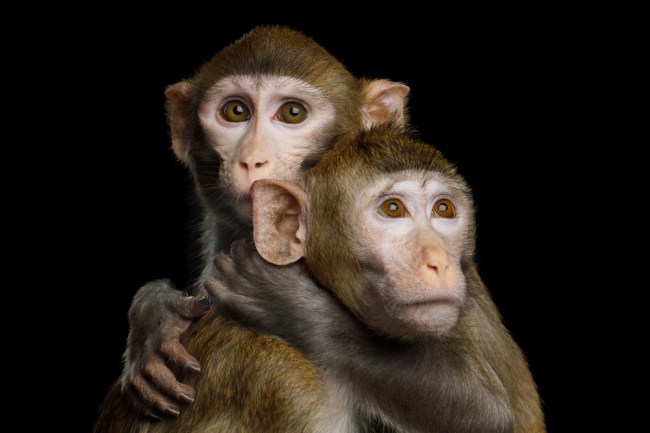
Shutterstock
Humans may have taken a step closer towards cloning homo sapiens. On July 5, 1996, humans created Dolly the sheep, which was the first mammal cloned from an adult somatic cell. Since Dolly, scientists have cloned nearly two dozen kinds of mammals, including dogs, cats, pigs, cows, and ponies. Now, scientists have made a tremendous breakthrough; for the first time ever humans have cloned a primate. Two healthy monkeys were created in a lab and now it begs the question: “Is the next step cloning humans?”
Two identical long-tailed macaques were born eight and six weeks ago at the Chinese Academy of Sciences Institute of Neuroscience in China. However, there were several speed bumps along the way to creating the cloned monkeys. The process took 127 eggs and a total of 79 different transfer attempts to engineer the healthy cloned primates. The monkeys named Zhong Zhong and Hua Hua are the first to be produced using the single cell nuclear transfer (SCNT) process, which involves “transferring cell nucleus DNA to a donated egg cell that is then prompted to develop into an embryo, and is the same process used for Dolly the sheep.”
“The barrier of cloning primate species is now overcome,” said Muming Poo of the Chinese Academy of Sciences in Shanghai. Poo said the goal of his team’s work is to create lots of genetically identical monkeys for use in medical research because they’re the animal most like humans. Researchers could clone monkeys with the same cancers, diseases or certain genetic defects to study treatments. “You can produce cloned monkeys with the same genetic background except the gene you manipulated,” said Dr. Qiang Sun, the scientist who led the team that produced the research that was published in the journal Cell.
Poo said his research team has no intention of clone humans and believed the procedure for people would be banned by society for ethical reasons. But there could very well be other scientists or companies who may push the limits of cloning in humans to create human organs and even entire humans. There are numerous ethical and legal questions regarding cloning humans, while others argue that cloning could wipe out babies born with birth defects and even duplicate a dead child. When do we get Jurassic Park?
Meet the first monkey clones, created in a Chinese laboratory.
Scientists say they expect more to be born over the coming months.https://t.co/zk1rJVLGtk pic.twitter.com/UzVR3uxdZi
— BBC News (World) (@BBCWorld) January 24, 2018
[FoxNews]